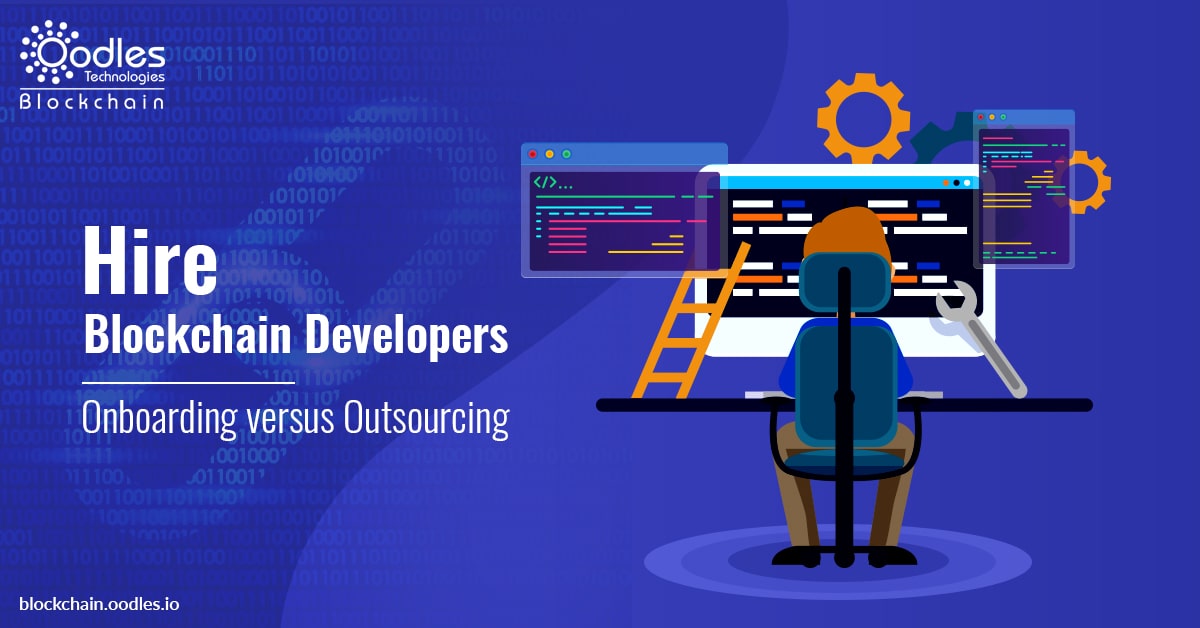-
Blockchain is growing exponentially in the digital space. It has started to make significant transformations for not only cryptos but a wide variety of industries as well.
As more and more companies look forward to adopting blockchain, the demand for qualified and skilled blockchain developer grows amazingly.
In reality, the demand is taking over the supply. Now, only after ten years of invention, it's becoming hard to get your hands on real blockchain experts who can create an ICO smart contract, launch an EOS based DApp, or devise an MVP for a blockchain project.
In this blog, we have outlined recommendations on how to find and hire the best blockchain developers or development company for your project.
Choose the right process of working together (Cooperation Model)
Mainly, you get two option to hire the best blockchain developers;
-
- onboarding
- outsourcing
Most organization prefer choosing the outsourcing model over hiring an in-house team. It because of the distinct advantages: time-saving, cost-effective, better quality, and the like.
Having an in-house team of blockchain developers solely to develop one project is not a feasible option. Then, it would be forming a company from scratch; you will need to interview numerous blockchain developers, arrange resources for the development, pay them for even sitting idle and whatnots.
However, opting an outsourcing blockchain development company can be a better option. You can sigh with relief and focus on your business aspects of the project, instead of getting indulged in the coding.
Know what you need beforehand
Before setting out to hire the best blockchain developers, ensure you have outlined your project's objective and the end-product.
Then, sit with a particular team, business analysts, PM, and the technical architect and thoroughly discuss your idea and requirements with them. Only specialists that will be working on the project would be able to help you determine the budget, the number of developers, and the scope you require to help reach your project to realization.
It's one of the crucial steps of hiring blockchain developers, because, for instance, creating an ICO smart contract, devising an MVP, or developing any blockchain related project development would require a completely different amount of time, money, efforts, and team size.
Skills the Best Blockchain Developers Posses
Regardless of the type of project, it requires a specific set of basic skills that every qualified blockchain developer must have.
So, let's take a gander at the skills blockchain developers should be equipped with, and ensure you hire the best of all.
Programming Fundamentals
A proper understanding of the basics of standard programming languages like Python, Simplicity, C, C++, Javascript, Java, OOPS concepts, Node JS, etc., is necessary. However, lately, two languages are also being used for blockchain projects development- RUST and GO.
Due diligence is a must before choosing the programming language based on the specifics of your project for hassle-free development.
Experience in the Blockchain Development
The blockchain programmers need to be proficient in working with DLTs (Distributed Ledger Technologies). A portfolio of successfully developed DApps, Blockchain MVPs, etc. could help in the better assessment of their expertise and experience in the blockchain development landscape.
Can they Properly Encrypt and Ensure Security?
Any blockchain developers around the world should be expert in encryption and decryption principles, the fundamental part of any blockchain product development. Indeed, it's better to outsource development of your project to the teams already working on blockchain projects.
The Cost to Hire the Best Blockchain Developers?
The actual cost estimation for blockchain development depends on the project scale and the end-product. It can vary vastly for EOS DApp Development and a full-service crypto exchange development.
Moreover, it also depends on the experience of the team and location. If we consider the US market, the cost of development is a bit higher. However, choosing an offshore blockchain development company in India or Europe can help you cut some cost.
Eventually, the wise words are that do evaluate the team you're hiring thoroughly and pay heed to its portfolio, language proficiency, timezone, reporting policy, cultural differences, etc.
-

Our Offices
INDIA
Emaar Digital Greens, Sector 61,
Gurugram, Haryana
122011.
Welldone Tech Park,
Sector 48, Sohna road,
Gurugram, Haryana
122018.














